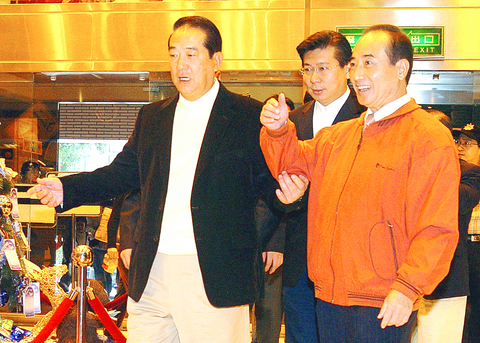People First Party (PFP) Chairman James Soong (宋楚瑜) and Legisla-tive Speaker Wang Jin-pyng (王金平) had a "casual meeting" yesterday, during which the two said that improving cross-strait relations is the key to resolving the planned Cabinet reshuffle and the long-stalled arms procurement bill.
Casually dressed and calling each other "good old friend," the meeting of the two pan-blue heavyweights yesterday seemed more harmonious than Soong's meeting with KMT Chairman Ma Ying-jeou (
Yesterday's meeting came in response to the president's request for Wang to exchange ideas with opposition parties on how to solve the arms procurement bill and Cabinet issues.

PHOTO: CHEN TSE-MING, TAIPEI TIMES
President Chen Shui-bian (
"It requires understanding and even support from the opposition parties to solve those issues. I already talked to Chairman Ma, and it is also necessary to seek PFP Chairman Soong's support," Wang said.
During the 80-minute meeting yesterday, Wang and Soong reconfirmed the consensus reached in the Ma-Soong meeting, which concluded that a clear policy was the priority concerning the Cabinet, that the pan-blue camp would only agree on a "reasonable" arms procurement bill, and that stable cross-strait relations are the key to all of those issues.
"Problematic cross-strait relations is the biggest issue in Taiwan's politics. We both agreed that only by breaking the cross-strait deadlock can Taiwan stabilize its domestic politics and revitalize its economy," Wang said yesterday after the meeting.
Soong echoed Wang's remarks, and also stressed the importance of reaching consensus in order to solve the Cabinet issue.
"If the government can draft a clear policy and reach a consensus with opposition parties, then it would be easy for the two sides to solve domestic issues and cross-strait problems," he said. "If we can do so, who forms the Cabinet will not be an issue."
Soong lauded Wang for playing a key role in the legislature, and said he believed the speaker can reconcile "unnecessary confrontations" between the governing and opposition parties on major issues.
Besides meeting with the KMT and PFP chairmen, Wang said he will also talk to the head of the Taiwan Solidarity Union and Non-partisan Solidarity Union to seek consensus.
Meanwhile, commenting on the Wang-Soong meeting, Ma said that frequent communication within the pan-blue camp should be encouraged.
"It's good. I think pan-blue leaders should meet more often to communicate with each other," he said yesterday after attending a municipal event.

The Ministry of Economic Affairs has fined Taobao NT$1.2 million (US$36,912) for advertisements that exceed its approved business scope, requiring the Chinese e-commerce platform to make corrections in the first half of this year or its license may be revoked. Lawmakers have called for stricter enforcement of Chinese e-commerce platforms and measures to prevent China from laundering its goods through Taiwan in response to US President Donald Trump’s heavy tariffs on China. The Legislative Yuan’s Finance Committee met today to discuss policies to prevent China from dumping goods in Taiwan, inviting government agencies to report. Democratic Progressive Party Legislator Kuo Kuo-wen (郭國文) said

The Ministry of Economic Affairs has fined Taobao NT$1.2 million (US$36,900) for advertisements that exceeded its approved business scope and ordered the Chinese e-commerce platform to make corrections in the first half of this year or its license would be revoked. Lawmakers have called for stricter supervision of Chinese e-commerce platforms and more stringent measures to prevent China from laundering its goods through Taiwan as US President Donald Trump’s administration cracks down on origin laundering. The legislature’s Finance Committee yesterday met to discuss policies to prevent China from dumping goods in Taiwan, inviting government agencies to report on the matter. Democratic Progressive Party

Taiwan and its Pacific ally Tuvalu on Tuesday signed two accords aimed at facilitating bilateral cooperation on labor affairs, according to Taiwan’s Ministry of Foreign Affairs (MOFA). The governments inked two agreements in Taipei, witnessed by Foreign Minister Lin Chia-lung (林佳龍) and visiting Deputy Tuvaluan Prime Minister Panapasi Nelesone, MOFA said in a news release. According to MOFA, the agreements will facilitate cooperation on labor issues and allow the two sides to mutually recognize seafarers’ certificates and related training. Taiwan would also continue to collaborate with Tuvalu across various fields to promote economic prosperity as well as the well-being of their

Sung Chien-liang (宋建樑), who led efforts to recall Democratic Progressive Party (DPP) Legislator Lee Kun-cheng (李坤城), was released on bail of NT$80,000 today amid outcry over his decision to wear a Nazi armband to questioning the night before. Sung arrived at the New Taipei District Prosecutors’ Office for questioning in a recall petition forgery case last night wearing a red armband bearing a swastika, carrying a copy of Adolf Hitler’s Mein Kampf and giving a Nazi salute. Sung left the building at 1:15am without the armband and covering the book with his coat. Lee said today that this is a serious